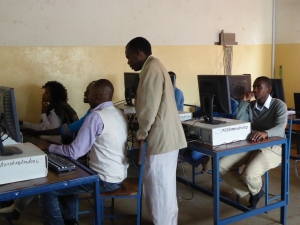Updates from 2013 schools [2014-10-12]

While last week’s main focus was the computer lab installation at Mwandet Secondary School, we also had a chance to visit two of our 2013 installations: Mukulat Secondary School and Mlangarini Secondary School. One of the highlights was participating in the awarding of certificates for the top-performing teachers and students in computer use at Mukulat (some photos are posted on the Reneal IEO Facebook page). At both schools we gained valuable information about what is (and isn’t) working, from which we can learn for future installations.
Similar to the Philippines, secondary school students in Tanzania choose a focus area for their electives. At Mukulat, 85% of students selected IT. However with only 16 computers, the schools decided to limit participation. A total of 64 first year students and 48 second year students were selected for computer study. Beginning in January, they were divided into seven groups of 16 for weekly sessions in the computer lab. The first year secondary curriculum in Tanzania really focuses on theory: the concept of information, parts of the computer, the history of IT, and so forth. Thus the first year students at Mukulat mainly used their hands-on time on the computers using the typing games and exercises to build their keyboarding skills. The IT teachers report that the students really enjoy these activities, making learning fun. In the second year, students learn about word processors and spreadsheets. For their hands-on time, LibreOffice was the primary tool. Second year students also learn about the internet, so the RACHEL package with its web-like interface will be a great way to learn about browsing and clicking even though the school does not have internet access. The IT teachers at Mukulat reported happily that the IT students now know how to use the mouse and keyboard, and they have learned how to create, save, and reopen files. These may seem like small steps, but it is huge for kids who just saw a computer for the first time earlier this year. The IT teacher reminded us of a defective hard disk that we’d left behind last year. He had opened up the case to reveal the moving parts and was using it as a teaching aid – even our junked parts are useful!
At Mlangarini Secondary School, they reported that the Khan Academy videos have been useful. Some of the educational programs are not intuitive enough for these beginning students, so more instruction would be helpful. The biggest challenge at Mlangarini is that they are off the grid, so they are running the computers on a generator. Last year’s expectation of either a larger generator or getting onto the grid has not yet come to pass, so there is only enough power to run 8-10 computers (out of 20 total) at a time. Four computers donated by the Airtel phone company can’t be used because the monitors won’t run on generator power. Given the limited number of computers that can run at one time and the hassle and expense of running the generator, this has been a significant hindrance to lab use. And finally, the Uninterruptable Power Supply (UPS) won’t reliably charge off of generator power so the protection afforded by the UPS is not available. We will take these challenges into consideration in future school selections.
One important thing that we learned from both schools is that a better layout for computer labs is to position the computers around the edge of the room, rather than having rows of tables facing the front. With this configuration, one student can be working while others watch from behind. At Mukulat in particular, the space between the rows is so cramped that really only 16 kids can be working in the lab at a time.
From a hardware perspective, all of the equipment obtained last year from the World Computer Exchange is still working. We had to replace a couple of CMOS batteries, but overall things are looking good. It certainly helps that the climate is fairly benign here, although it is very dusty in the dry season.
During our visits to Mukulat and Mlangarini, Neal added the RACHEL educational materials to their servers. The IT teachers seem quite excited about RACHEL and the opportunities these resources give to students and teachers.


